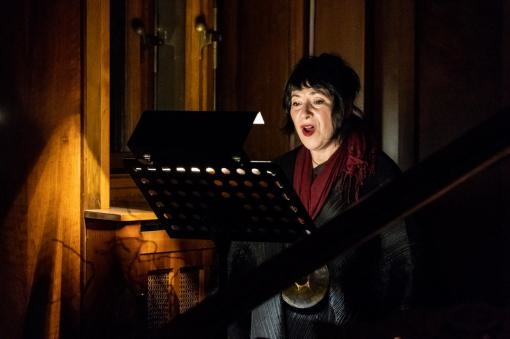The Exposition of New Music festival has been confronting Brno listeners with contemporary Czech and world music for thirty-one years. Over this time, the festival’s concerts have gained a devoted audience wishing to experience the non-traditional musical works and experiments themselves. The autumn part of this years’ festival begun yesterday with the vocal cycle Canti del Capricorno by the Italian composer Giacinto Scelsi, performed by solo soprano Lore Lixenberg.
The music of Italian aristocrat Scelsi is still unknown to most listeners. His works begun to reach the wider awareness of artistic public quite late, in the 80’s. Scelsi, who regarded himself as more of an interpreter for the world of ideas than a composer in the traditional sense, built most of his artistic work on manifestations oscillating between traditional European musical elements, Asian culture and transcendental mysticism or autotherapy. Because he was self-taught in the area of musical composition, he could use his unconventional and innovative musical conception to create a fully specific and progressive work. In his secession from the modern music and avantgarde of his time, he was left to use uncharted sound – not strictly musical – territory, which he used mostly in his works in the 60’s. The song cycle Canti del Capricorno also comes from this period.
The darkened auditorium of the Brno functionalist Stiassni Villa creates a melancholy and meditative mood. The quiet, almost slightly grim, and yet cosy space flares with a mysterious charm and elegance. There are works which with ideal acoustics can utilise their musical effect almost anywhere. These include most of the “understandable” range of music. Thankfully, art does not rely for its range only on these compositions – there exist songs and works that need a certain space to show all their charms. Canti del Capricorno belongs unmistakeably into this category. It was visible straight from the first concert that the mysterious atmosphere they managed to create in the villa would be a great positive influence on the resulting artistic production. However, the connection of the atmosphere with the striking, piteously wrenching performance of singer Lore Lixenberg surpassed all expectations. The soprano walked through the villa as an ethereal and unearthly being, whose world is as incomprehensible for the audience as it is marvellous and fascinating. Her almost strained voice came from every corner of the building in a different way, creating different connotations. The strongest moment was when Lixenberg moved to sing in the villa gardens and her voice carried silently into the auditorium.
Scelsi’s music, despite its undeniable alien feel, included a lot of what is well known. When listening to the work, the author’s attempts to deconstruct order and to make the different musical phenomena sound in contrast was obvious. Traditional opera elements stood together with Asian throat singing and elements so far unexplored. In every moment, something sounded that would have come as traditional, normal and functional in the former context, while here it was a scattered collage bound together with completely unexpected methods. I was reminded of a passage from the book The Doors of Perception by Huxley, where he remembers his experiences when listening to the music of Carl Gesuald da Venosa. He says that all elements are by themselves fully ordinary, but their connection creates the unusual and unexpected. Were Huxley to have had the chance to hear Scelsi’s music, he would have spoken about it in the same way. Lore Lixenberg also managed to fully differentiate and make independent all of the separate elements – the opera vibrato in the dramatic parts was as believable as the guttural bleating coming from the completely different musical traditions of the east.
The opening of the autumn part of the Exposition of New Music had the atmosphere of a personal, private experience of each and every visitor of the concert. In Scelsi’s work, everyone who plays the author’s game can find their own story, own happiness, own demons, torturous memories and fatal failures. The composer is more a guide to the inner world inside each of us. And it is only up to us, how we come to terms with our own work.
Giacinto SCELSI: Canti del Capricorno (Songs of Capricorn)
soprano: Lore Lixenberg
Stiassni Villa, 11 October 2018
































No comment added yet..